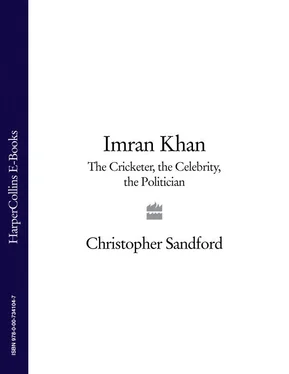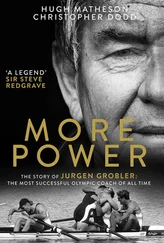The institutional turbulence of Pakistani public life, then, if anything merely perpetuated the hostile working environment of Imran’s playing days. This extended right through his career, and managed to blight even some of his greatest triumphs. Fresh from winning the World Cup in March 1992, several of the Pakistan players expressed dissatisfaction with their captain (who top-scored in the final itself), or more specifically with his reported suggestion that certain funds go to his hospital rather than to themselves. The Board of Control conspicuously failed to back Imran, with the result that he declined to tour England that summer, signalling the end of his 21-year Test career. Any cricket team can have a falling-out when things are going badly. It takes self-destructive skills of a high order to do so when that team have just become world champions. Four years later, the cup final was staged in Lahore and, perhaps predictably, ended in organisational chaos. The prize-giving ceremony turned into a shoving match between supporters and opponents of Prime Minister Benazir Bhutto, who watched the melee with a frozen smile, and was eventually brought under control by police in full SWAT gear, against a backdrop of exploding smoke bombs and the widespread kindling of bonfires in the stands. This was not quite the ‘simple, dignified [and] appropriate piece of ceremonial’ the home board had promised in its pre-tournament literature.
Imran’s first year in charge of Pakistan had revealed him as a tough, decisive, sometimes impulsive captain, not immune to occasional erratic streaks yet fortified by common sense. His third Test in office, against England at Headingley, saw what Imran calls some ‘truly bizarre’ decisions by the English umpires, notably one that arguably cost Pakistan both the match and series. This was David Constant’s keenly debated lbw against the Pakistan batsman Sikander Bakht, a verdict which put those with long memories in mind of the Idrees Beg fiasco at Peshawar 26 years earlier. Of course, mistakes happen. But Imran was so stung by the incident that when Pakistan returned to England in 1987 he formally asked that Constant be appointed for only one Test, if even that, of the five-match series. At the time, Constant, still only 44, was widely regarded, at least by his employers, as being at the top of his game. The Test and County Cricket Board declined Imran’s request and then leaked details of it to the press, resulting in ever more colourful variants of Today’s ‘WHINGEING PAKIS’ headline at intervals throughout the tour. (Imran and his board were to prove similarly unresponsive to England’s concerns about the appointment of certain Pakistani umpires to officiate in the return series six months later.) By the time of the third one-day international, before the Tests had even begun, the tabloids were accusing Imran’s team of out-and-out cheating — not a charge any fair-minded man of some integrity, let alone one descended from a long line of Pathan warriors, was apt to ignore. And he didn’t. The repeated allegation was a blow Imran felt personally, if only because of its implied slur on his family honour — ‘The carping never let up. It got to me,’ he told a close English friend. Still, if the general intention of the headlines had been to undermine Pakistan’s or more specifically Imran’s confidence, they seem to have backfired spectacularly. If anything, they galvanised him. The tourists duly won their first ever rubber in England. Their captain, with 21 wickets, was the player of the series. As a rule, Imran wasn’t a belligerent man, but his back went up when he was attacked or put on the defensive. From then on things were never quite the same between the English cricket authorities and the world’s foremost all-rounder. *
Since the generally tempestuous atmosphere in which Imran operated for so long is such a significant part of the story, it’s perhaps worth dwelling on this relationship just a moment longer. The folk memory of Pakistan’s England tour of 1987 has it that the visitors were ‘serial cheats’, ‘con artists’ who had ‘perfected the art of intimidation’ by histrionic appealing, frequently accompanied by the fielders ‘racing maniacally at the umpires [while their] English opponents could only watch in disbelief … Imran’s men were the most undisciplined team yet seen on these shores.’ This account perhaps requires correction. It’s true a certain petulance occasionally crept into the proceedings, and more than once Imran’s direct intervention was required to prevent what threatened to become a full-scale evacuation of toys from the visitors’ crib. But some background context might be in order. In trying to assess the barely concealed mutual hostility between the Pakistan team and most non-partisan observers, we have to acknowledge that both sides in the debate had ‘form’. That the Pakistanis could be a touch excitable was no newsflash. But the roots of their particular problem with specifically English officialdom were almost certainly deeper and more intricate than the Sun or Mirror let on, and included a whole gamut of neuroses, ranging from rank paranoia to what psychologists call a ‘morbid utterance of repressed infantilism’ — or resentment — towards the former mother country. It’s admittedly unlikely that many of the Pakistani bowlers decided to appeal quite as often as they did because of some sense of post-colonial, psychic frustration on their parts. But it would be fair to say that there was a mutual edge to the proceedings. Imran later reportedly remarked that the ‘utterly unprincipled and vicious smear campaign’ unleashed by his exposure of incompetent authority figures had been one of the hallmarks of his career.
The following list of incidents is by no means exhaustive.
The second Test, at Lord’s, of the England-Pakistan series of 1974 ended in some disarray when the tourists’ manager Omar Kureishi called a press conference to protest at the inadequate covering of the pitch, which had opened up a conveniently placed crack for the English bowler Derek Underwood to exploit. Kureishi’s opening remark was, ‘Gentlemen, I am not accusing you of cheating but of gross negligence.’ Harsher words followed, in the privacy of the Pakistanis’ hotel, over how such conditions could ever have existed at the ‘so-called headquarters of cricket’. It would be true to say that there was a broad tendency among many of the tourists, Imran included, to interpret such incidents in a racist light.
Two years later, the touring Pakistani captain Mushtaq Mohammad made much of the ‘absurd’ umpiring that he believed had cost his side the series. This time the venue was the West Indies. Seeming to confirm the Pakistanis’ impression of institutionalised bias against them from whatever quarter, the next major incident, in October 1978, came at Faisalabad. The final day’s play in a generally ill-tempered encounter between Pakistan and India was delayed by 15 minutes to allow the umpire Shakoor Rana to harangue several of the players. This was not to be an entirely isolated incident in Rana’s long career. Nine years later, standing at the same ground, he became embroiled in a discussion about gamesmanship with the England captain Mike Gatting. The language employed throughout the exchange was basic. Six hours of playing time were then lost while Gatting, to his very vocal displeasure, eventually composed a written apology acceptable to Rana. As a result of this and other perceived slights, the Pakistan board initially withheld a substantial slice of the guarantee money owed to their English counterparts. The England authorities replied by awarding £1,000 to each of their players by way of a ‘hardship bonus’, a move that did not visibly improve the host team’s mood at the post-tour press conference.
Читать дальше












